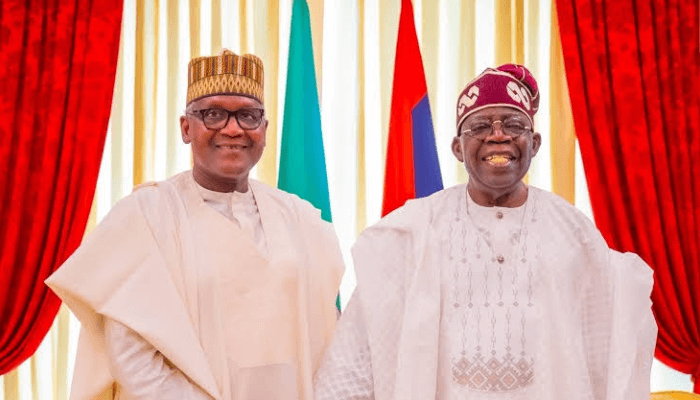By Abdulkarim Ibrahim
Aliko Dangote, Chairman of the Dangote Group, met with President Bola Tinubu at the Presidential Villa in Abuja on Tuesday evening. This was their first official meeting at the Villa since President Tinubu visited the Dangote Refinery on June 5.
Dangote arrived at the Presidential Villa shortly before 7:00 p.m. and departed after a meeting lasting about 30 minutes. He did not speak to the press upon leaving.
Neither Dangote nor the President’s team disclosed details about what was discussed during the meeting.
The meeting occurs against the backdrop of public statements made by Dangote regarding challenges in Nigeria’s downstream oil sector. He has also spoken about plans to change the country’s fuel distribution framework.
On July 11, while hosting visiting energy executives, Dangote stated that government-owned refineries in Port Harcourt, Warri, and Kaduna “may never operate properly again,” despite approximately $18 billion reportedly spent on their rehabilitation. He called for what he described as “bold policy shifts” to reposition the sector.
In mid-June, Dangote also announced that his 650,000-barrel-per-day refinery in Lagos would begin direct supply of petrol and diesel to retailers and major end-users from August 15, bypassing traditional fuel traders. The move drew criticism from industry bodies, including the Natural Oil and Gas Suppliers Association of Nigeria, which raised concerns about potential job losses.
The Tuesday meeting follows these developments, as well as ongoing conversations about the role of private refineries in stabilising Nigeria’s fuel market. Though no official agenda was shared, the timing has drawn attention to potential discussions around regulatory frameworks, fuel pricing, and domestic energy distribution.
The Lekki-based Dangote Refinery is Africa’s largest single-train refining facility, built at an estimated cost of $20 billion. It is widely seen as central to Nigeria’s efforts to achieve fuel self-sufficiency and reduce reliance on imports.
Tuesday’s closed-door engagement suggests continued dialogue between the presidency and key industrial players as Nigeria navigates reforms in its energy sector.
